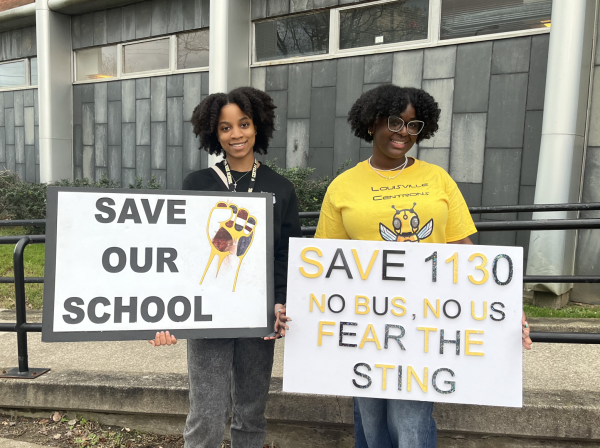Is Kentucky safe for animals?

Two dogs rescued by Chelsea’s Legacy, a nonprofit rescue center.
November 30, 2022
Kentucky is known for our affinity for horses to the extent that we host a week-long celebration for the Derby. However, is Kentucky really as safe for animals as we think?
Jeanine Skendzel is a member of Chelsea’s Legacy, a rescue center focused on small dog breeds. She recalled a domestic violence case involving a Yorkshire terrier, where the “woman’s boyfriend physically beat this tiny Yorkie to the point many bones were broken, including a shattered pelvis.”
This isn’t an isolated incident.
According to a report by the FBI Law Enforcement Bulletin, 75% of abused women with pets report that their partner had also threatened or intentionally harmed their pets. Sharing similar damage and responses to trauma, pets experiencing abuse are just as vulnerable as their human counterparts.
Both emotionally and physically abused dogs will sometimes deliberately avoid people and physical contact. Some dogs manifest their unresolved emotional trauma through defensive aggression towards people and other canines in ways such as snarling and biting. The recovery process for these animals is a gradual one dependent on strengthening trust with the traumatized animal. Akin to people affected by trauma, afflicted dogs face lifelong impacts from experiences in unsafe conditions.
One of my own dogs, Stella, who was adopted through Chelsea’s Legacy, had an owner previously but was forced to live tied up under a bush, often getting attacked by other dogs. She gets frightened when we leave, more than the usual dog, and cannot face large dogs at night. When she feels nervous, she’ll hide under small places.
My other dog, a shih tzu named Lulu, was rescued from an at-home puppy mill, and now she barely has any teeth left due to neglect. She hadn’t seen grass or known how to walk with a harness prior to adoption. For the first few months after her rescue, she would mostly stay in the backmost room, occasionally slinking into the living room to watch us before returning to her safe haven.
Animal abuse continues in Kentucky in part because laws regarding animal cruelty aren’t as clear cut as they may seem. In 2021, the Animal Legal Defense Fund (ALDF) ranked Kentucky’s animal protection laws 45th in the country, placing it in the bottom tier. In order to be designated in the bottom tier, the laws must have one strength and four weaknesses.
In their 2021 ranking, the ALDF points out the weak areas in Kentucky’s laws, like how felony charges are only applied to certain species and that veterinarians are not required to report the abuse of an animal. Under statute 525.135, the torture of dogs and cats is considered a Class D felony, while the torture of any other species is considered a second degree charge. However, if a person is charged once with the torture of a dog or cat, it is considered a Class A misdemeanor unless the animal dies or suffers serious injuries.
Activists propose a solution – a rather simple one at that.
“I absolutely believe that stricter and more protective laws would alleviate the number of animals that come to foster, specifically, stricter regulations surrounding puppy mills, breeding practices and dog fighting,” Jeanine said.
The ALDF works with local activists to advocate for improved laws that protect animals. In 2020, they successfully got Senate Bill 21 passed, which permits Kentucky veterinarians to report animal abuse.
Kentucky still has comparatively weak animal protection laws in the nation. To improve animal safety, activists continue to advocate for additional laws to protect animals, specifically regarding issues like shelter and cross-reporting from humane workers.

















